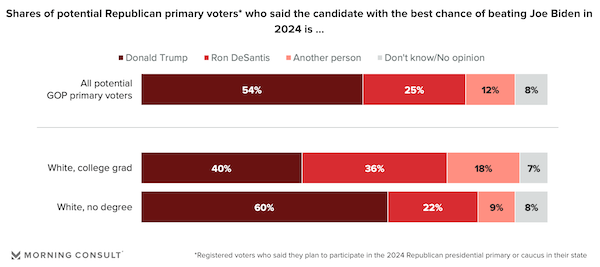As Donald Trump’s list of endorsements grows, so does the despair of his critics.
“The Republican Party has barely tried anything in their effort to move on and they are already out of ideas,” an exasperated Tim Miller wrote last week. Trump locking up the support of much of Florida’s House caucus under Ron DeSantis’ nose was bad enough; worse, to Miller, was Sen. Steve Daines and former Rep. Lee Zeldin lining up behind the former guy.
Zeldin nearly got elected governor of New York, might plausibly become RNC chairman some day, and was cracked up at one point to have a lead role in DeSantis’ presidential campaign. Daines is the head of the National Republican Senatorial Committee, the group in charge of recruiting and electing Republican candidates for Senate. He and Zeldin are influential leaders within the GOP establishment in different ways—and here they were endorsing Trump before DeSantis had even officially declared his candidacy.
“This is f—ing madness!” Miller exclaimed at one point in his piece.
Is it? It seems pretty rational to me.
It’s madness civically. No one who cares sincerely for this country would support returning a coup plotter to power. Every Trump endorsement is tantamount to the endorser declaring that they’re indifferent at best and hostile at worst to the project of American democracy.
But rationally? To behave rationally is to maximize one’s personal self-interest.
It seems to me Daines, Zeldin, and the rest have not only behaved rationally by endorsing Trump but that there’s no rational case—for now—for an influential Republican to endorse Ron DeSantis.
My colleague Chris Stirewalt has been thinking about this problem, too. How can DeSantis get traction among the Republican establishment when practically all of the incentives run toward endorsing his opponent?
There’s a reason DeSantis’ support among sitting members of Congress is currently limited to unusually dogmatic ideologues and to people who worked for him in Florida. Unless you owe DeSantis something or you take your beliefs so seriously that you can’t justify handing the country over to a decompensating authoritarian, self-interest points to letting it ride with Trump.
There are very few Republicans in the House or Senate who qualify on either grounds.
For the rest, the cost-benefit calculus is simple. There’s much to lose by making an enemy of Trump and little to gain by making a friend of DeSantis, assuming that the governor cares about having friends at all.
If you cross a figure as vindictive as Trump by endorsing his opponent, you’re inviting a serious primary challenge championed by the man himself. Eight of the 10 House Republicans who voted to impeach him in 2021 are now out of Congress, not by accident. And DeSantis winning the nomination with your help might not spare you from consequences: If anything, losing the primary would free up Trump next summer and fall to focus on prosecuting his vendettas against “disloyal” Republicans who supported the governor.
DeSantis won’t be able to punish Trump’s endorsers the same way. If he loses the primary, his grudges won’t matter to anyone, and he’ll put them aside anyway for the sake of rebuilding his bridges ahead of 2028. If he wins, he won’t want to risk alienating influential Trump supporters by penalizing them. Holding together a fractured Republican Party during the general election campaign will be his highest priority.
Think of DeSantis as a stock, in other words, touted as the next Apple. Buying it now might get you in on the ground floor of something amazing— but at the cost, potentially, of ruination. Why not buy the blue-chip Trump shares instead?
Particularly since, given the way Ron Inc. has performed lately, he looks less like Apple at the moment than he does Silicon Valley Bank.
He annoyed both wings of the party with his pandering on Ukraine. He passed two unpopular bills in Florida, a six-week abortion ban and constitutional carry, angering some of his allies in the donor class and creating liabilities for himself in the general election. He continues to wrap himself tighter around the culture-war axle with his deepening, increasingly pointless war with Disney. And the media is chockablock with stories about his personal aloofness, speculating that he lacks the retail skills to outperform a figure as charismatic as Trump.
Even if you’re willing to buy shares early in Ron Inc., there’s no guarantee that you’ll be treated as a valued shareholder. Per NBC:
A person with knowledge of the DeSantis operations described struggles in mastering interpersonal skills, building up an operation and focusing on effective policy messages.
Complaints are streaming in from donors who feel brushed off by DeSantis or left in the lurch after they are asked to assemble a fundraising event but then never hear back from someone in his circle. Trump is proving to be far more adept at winning early endorsements with his personal touch, wooing them with calls and personal meetings.
“They’re pushing back the ocean with a broom” that person with knowledge said of the DeSantis team. “People want to feel valued and appreciated. There’s none of that emotion there.”
For much of this year he trailed Trump by 15 points or so in the RealClearPolitics average. Over the course of April, as the two candidates began to campaign more aggressively and the Republican backlash to Trump’s indictment in Manhattan gathered force, DeSantis’ deficit ballooned to 28 points. Who would want to gamble their career by endorsing a candidate with a trend line like that?
There’s also an opportunity cost to endorsing the governor. The eminently likable Tim Scott is set to make his presidential candidacy official on May 22. Mike Pence should also enter the race in the next six weeks. If you’re a Republican congressman who simply wants a nominee other than Trump, there’s no sense endorsing DeSantis now instead of biding your time to see how Scott and Pence perform. It’s conceivable that one or the other will pass him in the polls, making them the One True Alternative instead.
All of that being so, what rational—i.e. self-interested—reason does any Republican politician have to endorse DeSantis at this point?
“You’re forgetting something,” you say. “DeSantis is more electable than Trump. The rational reason for Republican officials to support him is that he can return them to power in 2024. Trump can’t.”
Let’s think that through.
A unified Republican Party with DeSantis at the top of the ticket would outperform a unified Republican Party with Trump at the top, I agree.
But what if unity isn’t possible in one of those two scenarios?
Even if Trump declined to campaign actively against DeSantis after losing a primary, his most diehard supporters might boycott the general election. For instance, a new NPR poll found that 63 percent of Republicans want a second Trump term even if he’s convicted of a crime. Some portion of those voters, having seen him defeated by DeSantis, will surely conclude that the governor benefited unfairly from the machinations of Democratic prosecutors like Alvin Bragg and resolve to punish DeSantis by not turning out for him against Biden. Republicans could be crushed up and down the ballot.
Trump endorsing DeSantis might change their minds, but c’mon. There’s no universe in which that happens.
If, in short, you believe the party can maintain a meaningful degree of unity only if Trump is the nominee then it is in fact rational to endorse him.
I suspect that was Steve Daines’ logic, that only by unifying Trump with the Republican establishment can a reprise of the 2022 midterm disaster be averted. As head of the NRSC, Daines presumably believes that doing a favor for Trump now will lead him to repay the kindness when the time comes to endorse in Republican Senate primaries. No more Blake Masters or Herschel Walker types in 2024; this time, Daines hopes, Trump will owe him one and get behind the electable NRSC-approved candidates.
There’s another problem with endorsing DeSantis on grounds that he’s more electable than Trump. Republican voters don’t believe it.

The optimistic view of those numbers is that DeSantis has room to grow. As voters get to know him and absorb the hype about his landslide win in Florida last year, perceptions of his electability will improve.
The pessimistic view is that a twice-impeached insurrectionist who’s facing one criminal indictment and is likely to face more shouldn’t be leading anyone in contests of electability, let alone a governor who won reelection by 19 points in a swing state. If the midterms didn’t convince Republican voters that Trump is a drag on the party, it may be that nothing will.
That being so, is it “rational” for Republicans in Congress to endorse DeSantis on electability grounds?
If they have reason to believe right-wing opinion won’t move much on this subject and worry that impugning Trump’s electability will be taken as implying that the 2020 election wasn’t actually rigged, is it truly in their self-interest to pursue that argument?
If it’s more likely to get them primaried than to cause a sea change in perceptions of DeSantis’ viability, then I’d say no.
The electability case for DeSantis has also been hurt by Biden’s weakness. If the president were pushing 50 percent in job approval, if the economic seas appeared calm for the near future, if he wasn’t 80 years old and saddled with a running mate whom few Americans take seriously, Republican pols could plausibly claim that only a nominee with significant crossover appeal stands a chance of winning. Populists would need to vote with their heads instead of their hearts to avert doom in the general election.
As it is, Trump stands a real chance at reelection. He may be a slight favorite, in fact, given the likelihood that Biden will continue to decline because of age and that the country will endure a recession before Election Day. If both can win, why shouldn’t the base nominate the candidate they love over the challenger they like?
In fact, on issues from abortion to entitlement reform to vaccines, Trump is actually closer to the center than DeSantis is.
At a minimum, to endorse the governor on electability grounds, a Republican politician should want to see clear and consistent evidence from the 2024 polling that DeSantis outperforms Trump in head-to-head match-ups with Biden. That evidence is lacking thus far.
I can imagine what Tim Miller might say to that. “The evidence is lacking because cowardly Republican politicians refuse to press the case against Trump. If they locked arms, endorsed DeSantis in unison, and declared that Trump can’t win, that might move the polls. You can’t know what effect a concerted anti-Trump effort might have if you never try!”
Maybe. In theory, more endorsements could only help DeSantis.
But believing that right-wing voters in 2023 might be reasoned with is an uncharacteristically optimistic view of the GOP base for a Never Trumper. What would happen if, say, the entire House Republican caucus endorsed the governor?
He’d be pilloried for it in right-wing media and dismissed as the candidate of the hated GOP establishment. Maybe he’d gain some votes afterward in the center of the party—or maybe he’d lose a bunch among the populists who currently prefer him to Trump. Whose opinion is worth more to the average primary voter in this party, that of 200 Republican congressmen on the one hand or Steve Bannon’s on the other?
The singular fact that every Republican politician lives with, day and night, at whatever level of government they hold office, is that the tiger is loose. You can’t control it. It’s doubtful that you can reason with it. All you can do is feed it so that it doesn’t eat you instead.
Approaching the tiger in hopes of convincing it that the thing it wants is bad may be described many ways but “rational” isn’t one of them. To do such a thing would require courage, a sense of civic responsibility, and a willingness to sacrifice oneself for the greater good. Predictably, hardly anyone in this wretched party has been willing to try while dozens have lined up to feed the tiger by endorsing Trump.
And if we’re being honest, even the civic case for supporting DeSantis over Trump isn’t as strong as it once was. I’d rather have him as president than a seditionist but the governor comes with his own serious illiberal failings. If you’re a traditional conservative desperate to turn the page on feral populism, you can (and should) endorse DeSantis but you should also be clear-eyed about what you’re getting. It’s necessary to support him but it’s impossible to be excited about it.
The terrible secret that’s been no secret at all for many years is that scarcely anyone in a leadership position on the American right actually leads. Conservative media is overflowing with “influencers” who dutifully parrot the audience’s opinion instead of trying to actually influence it. Republican politics is a simple matter of sticking a mirror under Trump’s nose periodically to make sure that he’s still breathing and, if it fogs up, taking care to stay on his good side until the next mirror check. No one in either industry is going to risk their cachet by endorsing an increasingly longshot DeSantis bid until they see compelling evidence that he’s got a shot to win.
He’ll have to persuade the tiger himself. Good luck to us all.









Please note that we at The Dispatch hold ourselves, our work, and our commenters to a higher standard than other places on the internet. We welcome comments that foster genuine debate or discussion—including comments critical of us or our work—but responses that include ad hominem attacks on fellow Dispatch members or are intended to stoke fear and anger may be moderated.